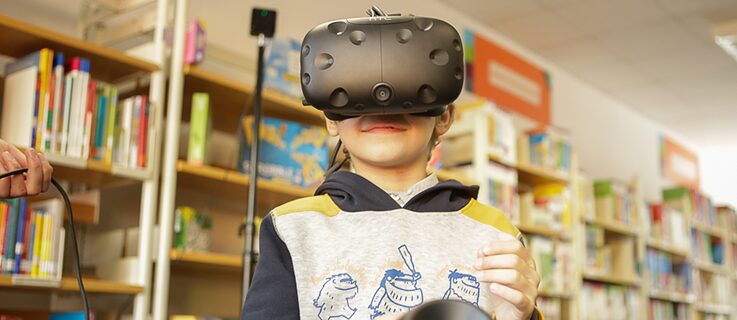Will we still bother to learn foreign languages in the future? Or will we simply have programs that translate languages for us simultaneously? How will digitization change the way lessons are designed? In our interview, trend researcher Peter Wippermann talks about possible ways in which (language) learning will develop in the future
Mr Wippermann, when did you learn your first foreign language?
I learnt English at school. It was all done in very much the traditional way: I learnt vocabulary, interpreted texts, answered questions in English in the classroom. Regrettably, schools in Germany nowadays have still not progressed much further than this.
You say it is regrettable that pen and paper are still the tools predominantly used in language learning. Which technical possibilities are available for teaching languages?
In the digital domain we take it for granted that we can use our smartphones, Alexa or Google for language recognition purposes. This is a trend that is bound to change the way we learn languages. The written form will be used much less, while automated translations will become a matter of course. Schools in Germany are not yet ready for this transformation.
Learning with virtual reality
May we one day see programs that allow us to travel around foreign countries while sitting at our computers at home?
Much is currently being tested in the field of audio with a view to allowing people to learn a foreign language – though without being able to write it well – on the basis of interactive listening. This is just the beginning. The use of artificial intelligence for language learning purposes is still in its infancy. When programs are capable of interlinking visual worlds with audio examples, we will see entirely new possibilities opening up. Virtual reality could also enable us to learn languages as if we were actually in the country in question.
Is that already possible?
While this is not widely used in language learning as yet, such scenarios do exist in the gaming industry. Attempts to link smartphones with virtual reality have been underway for the past two years, but as yet the technologies are still far too expensive. However, I am quite sure that the technical world will replace the analogue in many areas.
Are digital teachers one of the things you are thinking about?
While robot teachers are already used in Japan, we in Germany are very sceptical about robots. We are also not making the necessary funding available to conduct trials. However, we should be aware that artificial intelligence, though still very much at a rudimentary stage, will significantly change our lives. The research institute of the US Armed Forces predicts that by 2025 we will be working with quantum processors that are 100 million times faster than a standard PC today. We are heading towards a future that will be polarized – but one that will also entail entirely new opportunities.
“Our lives will change”
What does this mean as far as learning in the future is concerned?
In Europe we have accelerated the pace of learning in recent years. The introduction of bachelor’s and master’s degree courses in Germany has created an industrialized approach to learning that is all about standardization, acceleration and efficiency gains. The outcome is something that machines will do much better in the future. Alibaba founder Jack Ma says that we must be creative above all else – but this is something we fail to learn.
How could creativity be taught at schools or universities?
I do not claim to be able to provide any concrete visions – but today’s learning goals will no longer be relevant. Language technologies will be omnipresent in ten years’ time, so the question is whether we will in fact still need information in written form. The likelihood that we will no longer be writing any texts on an everyday basis, talking to machines instead, is very high.
But I am also glad when I have the chance to read up on information that is relevant to my everyday life or my job.
Well, you grew up in an era when this technology simply did not exist. 47 percent of young people under the age of 25 in Germany prefer to meet in the virtual rather than in the real world. The younger people are, the more they adopt new technologies. Live videos have long since replaced postcards or letters. And yet digitization only plays a minor role in teacher training. This should change.
Will there be any point in learning languages at all in the future? Surely programs could just do the communicating for me.
Language programs will be able to do a lot, but human contact will still be important – and cannot be replaced by technology, which is why we will continue to learn languages in future. As I imagine it, the future will be like this: we will take it for granted that we are connected to one another by digital means, but will continue to want to talk to and understand one another on a personal level.
Interested in how language will be taught and learnt in the future? Then why not take part in the Startklar?! conference.
The trend towards encapsulation and autonomy
Do you not find it problematic that we disclose so much personal information about ourselves in the digital world?
I take a realistic view: when one uses data, one also produces data. This data is stored, not only in one’s own country. The moment one enters into a contract with Google, it is Google that decides where the data is sent – and this will not be Germany or the European Union. That is a misconception that many people have.
Countries are currently increasing their own autonomy. The term “Heimat“ – homeland – is being used again in Germany. Why do you think this is the case?
This is a trend that many find unsettling. The utopia of globalization has given rise to a reverse trend towards national encapsulation. This is a phenomenon that can be observed not only in America, Turkey, Hungary, Poland or Denmark, but also in Germany. People are asking themselves who they actually are. This is the point at which language also begins to have a shaping character. People attempt to localize themselves in a bid to reduce complexity by downscaling the size of their world. I believe that people are trying to slow down the rapid transformations that are taking place in technology and power structures. We will have to wait and see where this will end.
 Photo: © ProSiebenSat1
Until 2015, Peter Wippermann was a professor of communication design, teaching at the Folkwang University of the Arts in Essen. He is also the founder of the Trendbüro – an internationally active trend research agency with offices in Hamburg and Munich. Together with Jens Krüger, director of the Kantar TNS market research institute, Peter Wippermann publishes the Werte-Index – an index of German values – every two years. To compile the index, the researchers study how Internet users discuss values in blogs, communities and forums. For the 2018 index, Instagram pictures were also included in the analysis for the first time. The most recent findings show that traditional values are becoming more important. The importance of success is declining, while nature took the number one spot for the first time, followed by health and family.
Photo: © ProSiebenSat1
Until 2015, Peter Wippermann was a professor of communication design, teaching at the Folkwang University of the Arts in Essen. He is also the founder of the Trendbüro – an internationally active trend research agency with offices in Hamburg and Munich. Together with Jens Krüger, director of the Kantar TNS market research institute, Peter Wippermann publishes the Werte-Index – an index of German values – every two years. To compile the index, the researchers study how Internet users discuss values in blogs, communities and forums. For the 2018 index, Instagram pictures were also included in the analysis for the first time. The most recent findings show that traditional values are becoming more important. The importance of success is declining, while nature took the number one spot for the first time, followed by health and family.
